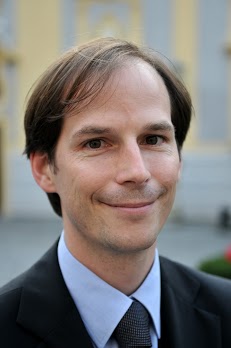Interview: Peter Parycek and Noella Edelmann on digital democracy best practice, localism, and e-government
Does democracy have a digital future? At a recent conference at Danube University in Krems, Austria, Sean Kippin asked the co-Chairs of the recent digital democracy and e-government conference (CEDEM) – Peter Parycek and Noella Edelmann – whether politicians were capable of making the necessary transition to digital, what the implications were localism, and which countries were managing the digital transition well.
Part 1 of this interview can be found here.
SK: Are politicians capable of managing complicated processes such as a transition to a more digitally oriented democracy?
PP: I’m am an optimist, but I do think it will be very difficult for all of us. The people who are doing politics would stand to lose a lot of power, so when the question comes up, they aren’t interested in engaging with the process. There was a wonderful keynote address after the Obama elections by a colleague of mine around three years after the 2008 Presidential election in the US, and the speaker was so very disappointed by what had happened. There was so much “Hope”! for real change, and at the beginning Obama tried with initiatives like OpenData.gov, and his town hall meetings, but after around a year everything in that area fizzled out.
NE: A lot of people were deeply disappointed in Obama. I remember seeing a wonderful presentation looking at how at everything that was at first open and Obama would talk about the process of governance as being about what “we” were doing. After that, it all became about what “I” am doing, thinking. It was “We” during the election and “I” after a while in government, and that was symbolic of the way his approach to government changed.
PP: Maybe he really tried to change it, but found the Washington D.C. system too established, and he couldn’t change it. Even if we are polite with regard to Obama, and we give him the benefit of the doubt in assuming that he did genuinely want to make this change, he wasn’t able to do so because the system was too established, embedded and strong. Even the American president wasn’t able to change the system: if he can’t, who can?
SK: Moving on, which countries are managing the digital transition well, and what is that they’re doing?
PP. It really depends on how you define ‘well’. If you’re thinking about how you deal with data and artificial intelligence, then the United States is the leader. Their military and defence capability means they’re extraordinarily advanced on a technological level. We saw this during the Cold War with the military focus manifesting itself in technological innovation generally and the creation of the internet specifically, arising from their need for a stable and decentralised network.
They’d make the decision that such a thing was needed, and they’d spend the necessary money to carry out the research. The same happened after 9/11. Immediately, they set up a completely new programme to analyse data on an enormous scale. Who is processing the most data in the world? It’s the NSA. They have built up extraordinary knowledge over the past few years. Once these things are established they begin to have other applications, for example in commerce. So in terms of building systems to analyse and take advantage of data, it is the United States.
In terms of the governance of the whole state, I would say Singapore. They analyse data endlessly. The trigger for Singapore was Avian flu. They came up with an interesting mind-game, and asked; what would have happened if we had analysed all of the data which we had at the time of the outbreak? There was a very clear answer, which was that they would have fixed it immediately. And because they had a real economic breakdown as a result of the outbreak, and that was really the spur for this new approach. So they turned to the analysis of data, and they have started using it to really govern the state.
In regard to the traditional aspects of e-government, I would say that the UK is doing a good job. Also, Austria is doing well – but in a very traditional sense. For example digitising existing governmental processes. The UK is in the lead when it comes to more modern approaches. If you approach a UK website it really is state of the art, and it has been pushed forward a great deal in recent years. Most countries are still in the ‘1.0’ design phase. But in Austria, ‘behind the curtain’ is doing ok. Estonia is also doing well when it comes to internal linkages between their databases. They’re very good at that here in Austria, too. The census is done completely electronically, through looking at 18 different databases, and then you click, and there’s your census!
In regard to electronic identity and voting, Estonia is the world-leading country. 70% in the last election voted electronically, so their whole society is very digitised.
SK: On Estonia, their system rests on a unified identity card system. In the UK there’s a great appetite for online voting but we didn’t like ID cards when they were propsed – is there a way of squaring that circle?
PP. In Estonia they were very pragmatic. Theirs isn’t actually the most secure system – they just said “let’s do it!”. But it was easier in Estonia because its more or less a city (in terms of size). There’s no federalism, so you don’t have to discuss anything with the Scottish government or Parliament for example. So if Estonia is mentioned as a best practice case, you do have to be careful. The state is small and centralised, but they did do a great job because they had a very strong President. He made the decision, and he saw it through, because he was and is in love with technology and he used that passion to change the whole state. There can only really be change if one or more of the country’s leaders is in love with technology. Perhaps after some time he or she can change the whole system.
India will be interesting, because the new Prime Minister is a great lover of technology. He came from Gujarat state, which is the leading state in e-government, and I saw him give a brilliant talk about their e-government ideas and projects and I immediately said ‘this could be a presentation from Europe’. Now he’s the Prime Minister, with a billion people living under the government he leads. Perhaps India could become a leader in this regard? Of course, they do have big issues to navigate such as religion and poverty, but in the future its worth looking at. Because it is the world’s biggest democracy, it has a highly skilled workforce and big companies, it has a Prime Minister who loves technology. Things aren’t as settled there as our fat, settled, complacent democracies, so change could be afoot.
SK: Is there a tension between increased localism and devolution and digitisation? Does the latter act as a centralising force?
PP. Maybe yes, maybe no! You can use technology for decentralisation, too. If you’re able to find a common definition of ‘shared services’, they can run centralised or decentralised services, but the service itself is highly standardised. So if you can set up the main services and then share it, perhaps it can be effected or modified a bit for the local needs in question, that could have great potential. The question is how to use technology to govern on a local level. I think the local level will have a great future in a digital future, because it enables you to do things on a local basis. However you define the elements, and how deeply you should govern the whole state. If it is completely fragmentised, then the state is in trouble. You can look back into history – in West Germany, every city was its own state, and it wasn’t very successful. They had fun, and independence, but Napoleon also had a lot of fun and took it all over. So you need some policy areas reserved for a national level, and then what you can govern on the local level, to find the best conception of governance. And technology will change these conceptions. But we have to discuss it, define it, and how to use technology to make it work best.
—
gives the views of the authors, and not the position of Democratic Audit UK, nor of the London School of Economics. Please read our comments policy before posting.
—
Professor Peter Parycek is the Head of the Centre for E-Governance at Danube University, Krems, and the co-Chair of the 2015 CEDEM conference.
Noella Edelmann is the co-Chair of the 2015 CEDEM conference, and academic staff at Danube University, Krems.
![]() This interview was carried out at the 2015 CeDem conference in Krems, Austria.
This interview was carried out at the 2015 CeDem conference in Krems, Austria.








 Democratic Audit's core funding is provided by the Joseph Rowntree Charitable Trust. Additional funding is provided by the London School of Economics.
Democratic Audit's core funding is provided by the Joseph Rowntree Charitable Trust. Additional funding is provided by the London School of Economics.
[…] on digital democracy best practice, localism, and e-government. The interview was published by democratic audit UK on the 2nd July […]
.@DemocraticAuditUK Interview w/ Parycek & Edelmann on digital democracy. Could India become an e-government leader? https://t.co/zct2OYOCCD
Interview (by me): Peter Parycek and Noella Edelmann on digital democracy best practice, localism, and e-government https://t.co/k4L2iQpb0c
Peter Parycek and Noella Edelmann on digital democracy best practice, localism, and e-government https://t.co/4xod1Po1Xw @iapem
Interview: Peter Parycek and Noella Edelmann on digital democracy best practice, localism, and e-government https://t.co/zFdDPQK7iF
Interview: Peter Parycek and Noella Edelmann on digital democracy best practice, localism, and e-government: D… https://t.co/tGtqDOroW2
Interview: Peter Parycek and Noella Edelmann on digital democracy best practice, localism, and e-government https://t.co/IxzbZo5hww #Optio…
UK picked out for praise in this @democraticaudit interview by @se_kip on traditional e-government: https://t.co/6xlbN7ziS3 @cabinetofficeuk
Interview: Peter Parycek and Noella Edelmann on digital democracy best practice, localism,… https://t.co/TgmMQAZr8S https://t.co/7bCIaIGP98